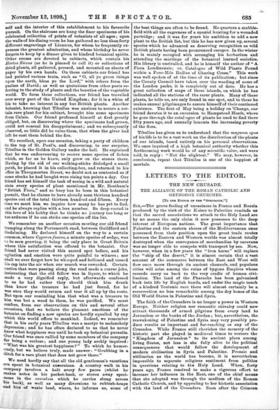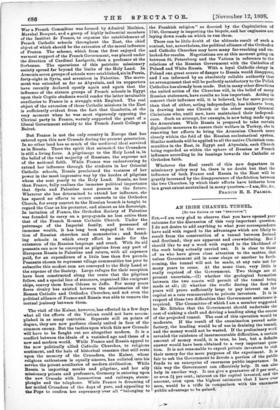LETTERS TO THE EDITOR.
THE NEW CRUSADE.
THE ALLIANCE OF THE ROMAN CATHOLIC AND ORTHODOX CHURCHES.
[To THI EDITOR OF THI SPECTATOR:]
Sin,—The grave feeling of uneasiness in France and Russia produced by the visit of the Kaiser to Palestine reminds us that the sacred associations we attach to the Holy Land are by no means the only claim it now possesses to the deep interest of European nations. The great importance that Palestine and the eastern shores of the Mediterranean once possessed from their position upon the great trade routes between the Eastern and Western worlds was almost totally destroyed when the conveyance of merchandise by caravans was no longer able to compete with transport by sea. Now, however, when in a few years the "iron horse" will replace the "ship of the desert," it is almost certain that a vast amount of the commerce between the East and West will flow once more through its ancient channels, and populous cities will arise among the ruins of bygone Empires whose records carry us back to the very cradle of human civi- lisation. The land of the Pharaohs has been galvanised back into life by English hands, and under the magic touch of a kindred Teutonic race there will almost certainly he a resurrection no less remarkable among the dry bones of the Old World States in Palestine and Syria.
The faith of the Crusaders is no longer a power in Western Europe. Neither religion nor romantic chivalry could now attract thousands of armed pilgrims from every land to Jerusalem or the banks of the Jordan ; but, nevertheless, the reawakening of Palestine and Syria may very possibly pro- duce results as important and far-reaching as any of the Crusades. While France still cherishes the memory of the historic part she played in medimval times to restore the "Kingdom of Jerusalem" to its ancient place among living States, not less is she fully alive to the political consequences that would follow the development of modern civilisation in Syria and Palestine. Prosaic and utilitarian as the world has become, it is nevertheless impossible to separate religious sentiment from politics in questions relating to the Holy Land. When, forty years ago, France resolved to make a vigorous effort to increase her influence in the East, one of the chief means that she adopted was through the medium of the Roman Catholic Church, and by appealing to her historic association with the land of the Crusaders. Soon after the Crimean
War a French Committee was formed by Admiral Mathieu, Marshal Bosquet, and a group of highly influential members of the Institut de France, to organise the establishment of French Catholic schools throughout the East, the chief object of which should be the extension of the moral influence of France. The scheme, which from the first enjoyed the warmest support of the French Government, was placed under the direction of Cardinal Lavigerie, then a professor at the Sorbonne. The operations of this patriotic missionary society spread far beyond the limits of the Holy Land. In Armenia seven groups of schools were established, sixin Persia, forty-eight in Syria, and seventeen in Palestine. The move- ment was extended as far as Abyssinia, and its supporters have recently declared openly again and again that the influence of the sixteen groups of French schools in Egypt upon their Coptic students would render the latter invaluable auxiliaries to France in a struggle with England. The real object of the extension of these Catholic missions in the East is sufficiently evident from the fact that Gambetta, at the very moment when he was most vigorously opposing the Clerical party in France, warmly supported the grant of a liberal Government subsidy to the French Jesuit College at Beirut.
But France is not the only country in Europe that has entered upon this new Crusade during the present generation. In no other land has so much of the medimval ideal survived as in Russia. There the spirit that animated the Crusaders is still a living force. A pilgrimage to the Holy Land is, in the belief of the vast majority of Russians, the supreme act of the national faith. While France was endeavouring to extend her influence through the students in her Oriental Catholic schools, Russia proclaimed the vastness of her power in the most impressive way by the hordes of pilgrims whom she sent yearly to the Holy Land. Russia, no less than France, fully realises the immense political importance that Syria and Palestine must possess in the future. Wherever she has determined to extend her influence, she has spared no efforts to secure converts to the Orthodox Church, for every convert to the Russian branch is taught to regard the Czar as his protector, and almost as his Sovereign. In imitation of France, the Orthodox Society of Palestine was founded to carry on a propaganda no less active than that of the French Roman Catholic Church. Under the patronage of the Imperial family, and possessed of immense wealth, it has long been engaged in the erec- tion of Russian churches and monasteries ; and found- ing schools in which every effort is made for the extension of the Russian language and creed. With its aid peasants can now be conveyed as pilgrims from any part of European Russia to Palestine and return, with all expenses paid, for an expenditure of a little less than five pounds. Peasants chosen to represent village communities too poor to subscribe this modest sum are conveyed to the Holy Land at the expense of the Society. Large refuges for their reception have been constructed along the route that the pilgrims follow, and a special line of steamers, organised like emigrant ships, convey them from Odessa to Jaffa. For many years fierce rivalry has existed between the missionaries of the Roman Catholic and Orthodox Churches, and not even the political alliance of France and Russia was able to remove the mutual jealousy between them.
The visit of the Kaiser, however, has effected in a few days what all the efforts of the Vatican could not have accom- plished in as many centuries. Separate still on points of dogma, they are now perforce closely united in face of the common enemy. But the tactics upon which this new Crusade will have to be fought out are altogether modern. It is a conflict between the ideals of a vanished age and those of a new and modern world. While France and Russia appeal to the now politically allied Catholic Churches, to religious sentiment, and the halo of historical romance that still rests upon the memory of the Crusaders, the Kaiser, whose religious enthusiasm is equally sincere, has enlisted into his service the potent auxiliaries of modern civilisation. While Russia is importing monks and pilgrims, and her ally missionary priests and professors, Germany is entering upon the new Crusade with locomotives and railways, steam- ploughs and the telephone. While France is dreaming of her mailed Crusaders of the days of yore, and appealing to the Pope to confirm her supremacy over all "belonging to the Frankish religion" as decreed by the Capitulation of 1744 Germany is importing the bicycle, and her engineers are laying down roads on which to ran them.
There can be little doubt of the ultimate result of such a contest, but, nevertheless, the political alliance of the Orthodox and Catholic Churches may have many far-reaching and un- looked-for results. Negotiations are at this moment going on between St. Petersburg and the Vatican in reference to the relations of the Russian Government with the Catholics of Poland and White Russia. With a loyal Catholic clergy in Poland one great source of danger to Russia would disappear, and I am informed by an absolutely reliable authority that an arrangement that will be perfectly satisfactory to the Polish Catholics has already been made. Bat in many other directions the united action of the Churches will, in the belief of many Russian statesmen, have results no less important. Acting in concert their influence will, it is believed, be far more potent than that of either, acting independently, has hitherto been, in drawing into one Church or the other many Oriental Christians who, until now, have maintained their independ- ence. Such an attempt, for example, is now being made upon the Armenians. While Russia is prepared to take certain diplomatic measures to ensure their welfare in Turkey, she is renewing her efforts to bring the Armenian Church more closely within the fold of the Russian ecclesiastical system. Similar methods will be applied to all the native Christian com- munities in the East, in Egypt and Abyssinia, each Church being regarded as within the sphere of Russian or French influence according to its leanings towards the Catholic or Orthodox faith.
Whatever the final result of this new departure in missionary policy may be, there is no doubt but that the influence of both France and Russia in the East will be grcatly increased by the disappearance of the friction between the two Churches, by which their efforts have hitherto been to a great extent neutralised in many quarters.—I am, Sir, Sze., FRANCIS H. E. PALMER.







































 Previous page
Previous page